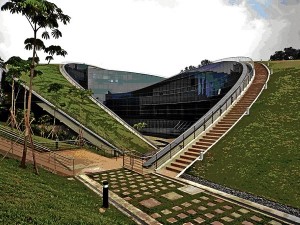
SINGAPORE’S green measures are voluntary for the private sector but mandates that all public buildings be certified by BCA Green Mark Platinum rating. All public existing buildings are mandated to achieve Green Mark Gold Plus standard by 2020. Photo from www.themalaysiantimes.com.my
Voluntary green building measures continue to be increasingly popular in many countries for the past decades. Starting with the most elementary strategies like providing insulation and window overhangs, many countries have moved on to more sophisticated green measures.
Today, more and more building owners are committed to reducing the environmental impact of their projects. Many set themselves off as environmental stewards in the business community as green building owners, or simply to reap the financial benefits of energy and material resources gained by green buildings, or simply to get tax breaks. The tendency now is to voluntarily go green for various pragmatic reasons.
All that however is changing as many countries now are gradually shifting from voluntary to mandatory green building measures.
Green building measures
In the United States, the state of California is leading the way with the California Green Building Code, or CALGreen, for implementing mandatory green building measures that apply to all newly constructed buildings or structures. It was adopted in January 2010 and became effective in 2011.
Singapore’s green measures are voluntary for the private sector but mandates that all public buildings be certified by BCA Green Mark Platinum rating. All existing public buildings are mandated to achieve Green Mark Gold Plus standard by 2020.
Japan has the Energy Conservation Law adopted in 1979. Building owners are obligated to submit a report on the energy conservation measures prior to construction. Compliance rate has been growing and is expected to reach 80 percent when the standards are finally made mandatory.
Here in the Philippines, there is no energy law that mandates building owners to adopt green building measures.
This is what has prompted the Department of Public Works and Highways (DPWH) and the City of Mandaluyong to embark on a project called the Green Building Project Development in partnership with the International Finance Corp. (IFC).
IFC is a member of the World Bank Group, which seeks to create opportunities for people to escape poverty and improve their lives. It seeks to foster sustainable economic growth in developing countries by supporting private sector development, mobilizing private capital, and providing advisory and risk mitigation services to businesses and governments.
IFC, represented by Advisory Services senior operations officer Hans Shrader, is collaborating with international technical consultants from WSP Group and local technical consultants from the Philippine Green Building Initiative (PGBI).
Green building projects
The Green Building project is expected to create energy savings for businesses, help reduce overall greenhouse gas emissions and improve energy, water and other resource efficiencies associated with new building construction in the Philippines.
To develop smart green building policies, the project team has been conducting original research on energy usage of buildings and building development trends, specifically in Metro Manila, Cebu and Davao.
This has resulted in a number of energy modeling baselines from which the impact of new green building development can be measured if new standards are applied to the industry.
The Green Building project is expected to draw up guidelines and strategies for adoption by building owners to conform to internationally accepted green standards.
The project will be officially launched next week during dialogues with local government units, professional organizations, developers, building administrators, building officials and national agencies.
For comments or inquiries, e-mail amadodejesus@gmail.com.